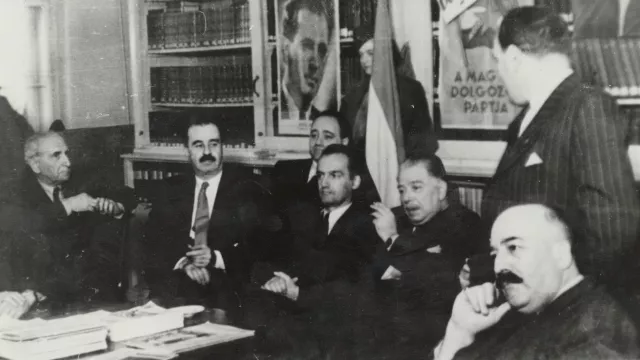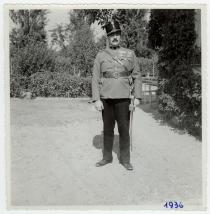Miksa Domonkos at a discussion at the Jewish community
This picture was taken in 1947 in the office of the Jewish community in Budapest, where they discussed that the Jewish Hospital had to be handed over to the state. Sitting, from right to left: Miksa Domonkos, Lajos Stockler, Dr. Janos Vikol communist under-secretary, who was a doctor and whose task was the nationalization of church-owned institutions. The person standing is Dr. Laszlo Benedek, head physician. It is interesting in this picture that on the wall of the office of the Jewish community there is the poster of the Hungarian Democratic Party and Antal Apro's picture.
After the liberation my father remained at the Jewish community and he became the secretary general of the Jewish community. The general assembly elected him correctly. Jewish life started to revive, the provision and aid of the people who returned from the deportation had to be organized, they had to keep in touch with Joint, the Hungarian Red Cross, and the National Committee for the Treatment of Hungarian Jewish Deportees. These were all important organizational tasks. Besides these there were representative functions, where he had to be present. So he was the secretary general and above him was the president, Lajos Stockler. They were already on good terms in the ghetto. Stockler also got an apartment from Wallenberg in the same Swedish protected house on Katona Jozsef Street.
I was against my father's involvement in Jewish life after 1945. Partly because in denominational life there was always envy and conflicts, and when the war ended my father was lauded by the officials, but some from the religious side didn't like the fact that a Hungarian officer was leading them. They brought up against my father - from their viewpoint with good reason - that he didn't go to the synagogue and that our entire life was Hungarian civil life, we children were expressly brought up in a nationalist way. They didn't like this at all. And they were right.
In fact he got in the Jewish community by accident. During the war he was needed, because since he had a rank and an officer's demeanor he could help very much in the ghetto, but he didn't behave like a Jew at all. Really, he never went to the synagogue, not even on the High Holidays, we didn't observe the kashrut, neither Chanukkah, nor seder, or anything. My stepmother was religious in her own way, she always lit the two candles on Friday evening, but she didn't go to the synagogue either, not even on the High Holidays, and she didn't have a kosher kitchen, because my father was absolutely against it. But I don't remember seeing a mezuzah in her apartment on O Street either.
I also objected to my father's involvement because in a Palestinian Hungarian newspaper they attacked my father, saying that he had shown favor towards the persons close to him, and, as they said, the Jewish aristocracy. But even the president, Lajos Stockler, was a big business man. Then they also brought up that the Jewish leaders must have known about Auschwitz, and that they didn't act on time, to save at least the Jews from the countryside from going there like cattle to the abattoir. This isn't true of course, since nobody could know in advance about the appearance of Eichmann's crew and about the actions of the authorities, because they deported the Jewry from the countryside so quickly, that it was astonishing in Europe. Even Westerners were surprised that this could be done in such a manner in Hungary.


































